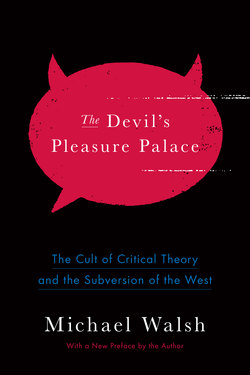Читать книгу The Devil's Pleasure Palace - Michael Walsh - Страница 2
На сайте Литреса книга снята с продажи.
ОглавлениеPraise for The Devil’s Pleasure Palace
“Ranging over the centuries and across the continents, from high culture to war to American society today, Michael Walsh has written a dazzling, exhilarating, and thought-provoking book. Whether we end up liberating ourselves from The Devil’s Pleasure Palace or not, Walsh has made clear what’s at stake.”
—William Kristol, editor of The Weekly Standard
“In this learned and engaging book Michael Walsh takes us on a literary, philosophical, and pop-cultural odyssey of Western society, from the Greeks to the present. He reminds us that in the age-old war for the soul of the West between the bored and nihilistic creatures of affluence and leisure and the autonomous individual who honors his past and seeks transcendence in his religion, the bad guys are exhausted and now meeting their comeuppance. A delightfully depressing tour that ends at an unexpectedly optimistic destination.”
—Victor Davis Hanson, senior fellow at the Hoover Institution, Stanford University
“There is poison in our bloodstream. Michael Walsh works to pump it out by bringing it to the light of day. The Devil’s Pleasure Palace shows us how we got here and how our souls and our culture are being suffocated. There is hope in knowing our history and wanting something better. This book equips that cause—one aimed toward heaven.”
—Kathryn Jean Lopez, National Review
“The highly readable The Devil’s Pleasure Palace tells the story of a group of European intellectuals decamping to the United States from Germany during and after the war. It follows how they became influential university professors and how pretty much every single awful thing you see happening at the University of Missouri and Yale and every other cultural center came from these wicked men. . . . It is likely you have never or only vaguely heard about cultural Marxism. You may have never known that it was critical theory your professors ladled out to you, or how it poisoned you. But now you know, and Walsh would say your job is as simple as World War II: find ‘Berlin’ and destroy it. He calls all men of goodwill, conservatives of whatever stripe, to band together to defeat the cultural Marxists now commanding the heights and threatening us all . . . Michael A. Walsh’s The Devil’s Pleasure Palace deserves a wide audience, especially among patriots. Reading it, you may even come to like opera; well, listen to some anyway.”
—Austin Ruse, Breitbart.com
“What Walsh has done here is no small accomplishment. He set out to write a book about the need for heroes, and created a work that is, in and of itself, a heroic act of truth telling.”
—Louis Markos, The Federalist
“The Devil’s Pleasure Palace is a challenging but unique and rewarding work powered by sustained flashes of brilliance. More importantly, it is a rallying cry for conservatives to reengage in the critical cultural battle which Walsh correctly calls the defining issue of our time. Its outcome will determine whether we who see ourselves as the conservators of the Western legacy—‘the primary engine of human moral, spiritual, social, scientific, and medical progress’—will ‘succumb to a relentless assault on its values’ or whether we will rally and crush the left’s ‘double agents, operating behind the lines of Western civilization.’”
—Mark Tapson, FrontPage Mag
“It is a dazzling book. It’s erudite, bold, entertaining, and important.”
—Jay Nordlinger, National Review
“If the past enemies of the West were wicked, the Frankfurt School and its ilk are Satanic in the precise sense of the word. Michael Walsh calls them by their right name: The new enemies of the West are Satan, in the precise way that we understand Satan as channeled by Milton and Goethe.”
—David P. Goldman, PJ Media and the Asia Times
“Michael Walsh asks in his book The Devil’s Pleasure Palace: How might people react if the land promised by modern cultural Pied Pipers turned out to be a hell? How if, after accepting abortion, the loss of individuality, the destruction of tradition, and a near utter reliance on the state, the end point was not utopia but dystopia? Worse, what if those two places are actually the same thing?”
—Richard Fernandez, PJ Media and the Belmont Club
